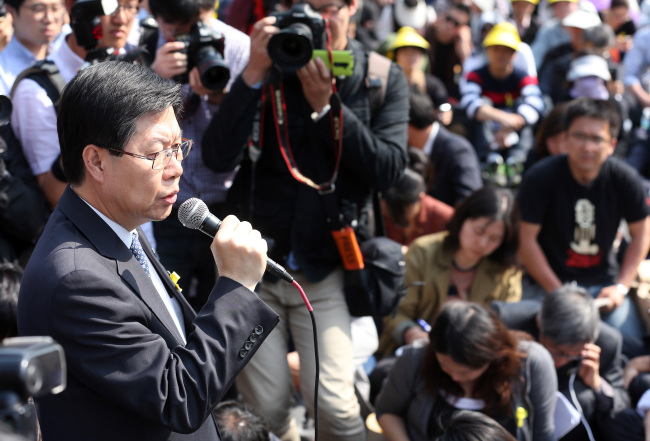A recently resigned executive of KBS touched off a political firestorm over the weekend after revealing that Cheong Wa Dae has intervened in the state-run broadcaster’s coverage of the ferry disaster and other sensitive issues.
Kim Si-gon, former chief of the network’s news bureau, said at an assembly of KBS reporters on Friday night that he had been under “constant pressure” over the content of news programs. Senior officials from the presidential office frequently gave him instructions by phone, he said, while KBS president and chief executive Gil Hwan-young ordered him to edit out or cut back on segments that may involve negative reports about the Park Geun-hye administration.
Kim stepped down on May 9 for inciting a public furor by playing down the Sewol tragedy at a dinner meeting.
Two major labor unions of KBS demanded Gil’s immediate resignation, warning of a strike and other measures.
Gil denied the allegations on Saturday. He said he would articulate his position at talks with workers on Monday.
Cheong Wa Dae has yet to express its stance.
 |
KBS president and chief executive Gil Hwan-young (left) apologizes to the families of the victims of the ferry disaster during their sit-in near Cheong Wa Dae on May 9 over inflammatory remarks by the head of the network’s news bureau. Yonhap |
“There is no single case of criticism against the president that has been aired,” Kim was quoted as saying at the Friday session. His remarks were disclosed by a KBS union consisting chiefly of reporters and producers, and broadcast on “Newsline,” the station’s late-night weekday news program.
“The rule was that the coverage of the president lasts 20 minutes (in the main 9 p.m. show). Each time the president traveled overseas, we struggled to fill the time.”
Amid widespread public anger over the authorities’ botched response to the ferry sinking, Cheong Wa Dae pressed Kim to “refrain for now from criticizing the maritime police since the rescue operation was under way,” he added.
His resignation was also urged by Park’s office and then Gil, Kim noted.
“Gil told me that he was contacted by Cheong Wa Dae and would look for my next job after three months,” he said.
“Gil was even shedding tears, saying should he disobey, he, too, wouldn’t survive, and this was the president’s will.”
For the state-run broadcaster, the exposure marks a rare move to put its own controversy under the spotlight, reflecting deep, long-festering frustration among the newsmen over their lack of political and journalistic independence.
Gil took the helm of the country’s largest television and radio network in November 2012 for a three-year term. He was appointed by the president on the recommendation of the board of governors, and has long been a source of controversy over the station’s journalistic integrity.
KBS unions have since accused Gil, 60, of “consecrating the company to power” along with his predecessor, Kim In-kyu, pointing to their rapid promotions during the Lee Myung-bak administration.
In a vote of confidence from May 15-17 by the 1,224-member union, a whopping 97.9 percent, or 1,081, voted no confidence. The turnout was 90.2 percent. They said they will conduct another vote on an all-out strike from May 21-23.
Another union, comprised largely of some 2,500 technicians, launched a one-man protest in turn on Saturday in front of Gil’s residence, vowing to block him from going to work starting Monday.
The KBS contingent of the Journalists Association of Korea, which has already pledged to boycott production, gathered on Sunday to discuss its next steps.
Editors of the network’s news bureau also held a meeting after tendering their resignations en masse last week, during which they were expected to demand that Gil guarantee the neutrality of future reporting. They have also urged him to step down.
The main opposition New Politics Alliance for Democracy calls for Gil and other KBS executives to attend an extra parliamentary session that kicks off Monday for a probe. But its prospect appears dim given the ruling Saenuri Party’s reluctance.
“The case of KBS, which has apparently been serving as the administration’s watchman under the direction of Cheong Wa Dae, must be thoroughly probed,” NPAD spokesman Park Beom-kye said in a statement Saturday.
By Shin Hyon-hee (
heeshin@heraldcorp.com)








